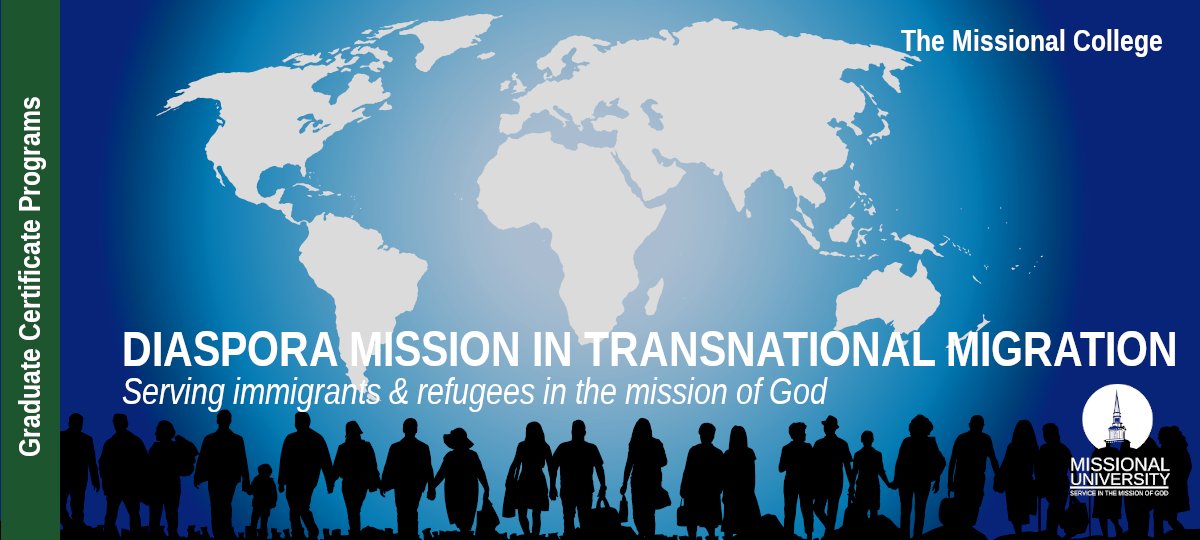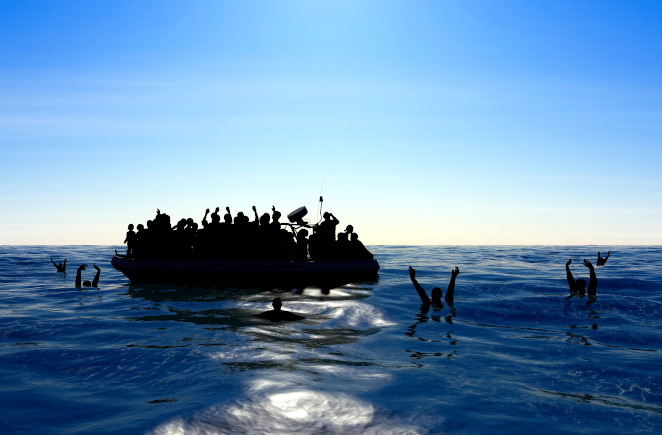
Online Graduate Certificate Program in
Diaspora Mission in Transnational Migration
School: Missional College // Study Area: Serving Among Cultural Difference
☀ Totally Unique Program = only available at Missional University
Expand Your Intercultural Abilities Today!
REQUEST INFORMATION
Ready to learn more about the
Undergraduate Certificate in
Diaspora Mission in Transnational Migration?
LEARN MORE NOW
The Graduate Certificate in Diaspora Mission in Transnational Migration is a humanities-based interdisciplinary Certificate program providing students the tools to study, encounter, and engage with immigrants, internationals and refugees across the globe.
Program Features
-
Integrated practicums allow you to gain valuable real-world experience
-
Learn from academic practitioners from around the world
-
Credits earned in this certificate program can apply to a Missional University Master's degree program
Course Effort
Course Length
Credits Required
Program Cost
What Will I Study?
We offer the most comprehensive approach to serving among internationals, immigrants and refugees in the mission of God.
Examines and analyzes the historical phenomenon of global people migration from a biblical theological perspective. The student will explore a variety of anthropological, biblical, contextual, political, sociological, theological issues, leading to a theology for missionally engaging the people of the contemporary Diaspora.
Preparation to lead displaced people by evaluating reasons for immigration and physical, emotional and spiritual issues related to relocation. Analyzes the differences between refugees for economic reasons and those driven out by persecution or war, and differences between change to near-culture or drastic cross-cultural adjustment. Examines contemporary experience, including how technology retains connections and potential ways to grow in community.
Choose two below:
Presentation of an analytical framework to evaluate the causes and consequences of refugees and displaced persons from the vantage point of the displaced person and the host community including various NGO and governmental entities. Through the assessment process, the student learns how to create a strategy using projects and processes to engage the refugee and host communities.
Foundation for understanding acculturation and integration issues among diaspora peoples experiencing variegated immigration, emigration and living patterns. Students will: research, analyze and interpret demographic data; interact with diaspora peoples in local contexts in culturally-appropriate ways; and explore strategies and methodologies for engaging these populations for the sake of ministering among them, with an emphasis on practice.
Training in social capital theory and its dynamics as they specifically relate to diaspora ministry. Ways of gathering data and research methods for analyzing how social capital ebbs and flows in its sources and resources (primarily through other people) will be studied. The goal will be to practically apply what has been learned to implement effective diaspora mission strategies.
Choose two below:
Examination of human trafficking and forced migration. It considers different types of human trafficking and the scope of the problem, both domestically and globally. Emphasis on physical, emotional, psychological and spiritual trauma experienced by victims and the methods used to recruit and control them. Entities such as government, the media, faith-based organizations, organized crime and culture and their roles play in this complex issue will also be explored.
Policy, knowledge base, value premises, and practice skills useful for working with families and children in immigrant communities. It examines historical trends, laws and policies, reform and challenges facing migrant communities. Students will understand how policies influence the lives of immigrants, social service delivery to immigrants and ethical dilemmas.
An overview of topics in mental health and public health issues for immigrant’s communities. It will cover epidemiologic issues and mental illness within the immigrant communities. Students will build the skills necessary to develop an integrated approach to the mental & physical health of immigrant populations.
An examination of global migration and human vulnerability and its impact on immigrants and refugees. The course focuses on the application of clinical social work assessment and intervention of the migrant groups to help individuals and families. Students will develop knowledge and skills that encompass the diversity of immigration experiences, refugee situations, acculturation and family processes.
An examination of public health issues among African & Black Diaspora in light of health belief model studies and the impact of those cultural beliefs upon their willingness to seek medical care. Students will evaluate strategies for community health promotion among African & Black migrants that addresses the issues health beliefs bring to bear upon medical care.
When Can I Get Started?
We offer multiple start dates each year to give you flexibility in your education, life and work schedules.
JANUARY
MARCH
MAY
AUGUST
OCTOBER
A Career in Navigating Cultural Difference
Is this Your Mission?
Immigration Advisor, Immigration Caseworker, Immigration Consultant, Immigration Coordinator, Immigration Counselor, Immigration Specialist, Immigrant Rights Organizer, Immigration Services Manager, Immigration Services and Education Organizer, Refugee Foster Care Case Manager, Refugee Ministry Coordinator, Refugee Rescue Coordinator, Refugee Resettlement Case Manager, Refugee Services Case Manager, Refugee Support Caseworker, Refugee Worker
Request Information Now
How Much Will it Cost?
We offer tuition based upon country of residence. According to the Human Development Index, all countries around the world fall into one of four categories:
-
(Tier 1) - Very High Human Development
-
(Tier 2) High Human Development
-
(Tier 3) Medium Human Development
-
(Tier 4) Low Human Development
Our tiered global tuition makes higher education affordable for everyone world wide.

TIER COUNTRIES
100% Tuition
$395
per credit hour
3 credit course
$1185

TIER COUNTRIES
80% Tuition
$316
per credit hour
3 credit course
$948

TIER COUNTRIES
60% Tuition
$237
per credit hour
3 credit course
$711

TIER COUNTRIES
40% Tuition
$158
per credit hour
3 credit course
$474
Tiered tuition based on country of origin and scholarships available. Find your country of residence here for more information.
Tuition may be further reduced by participating in the Sponsorship Program.
